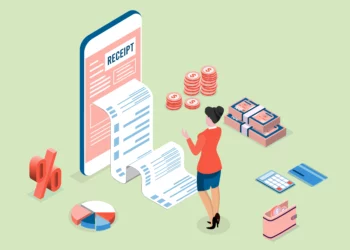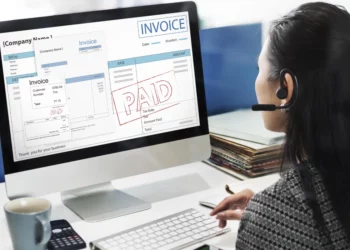Cloud ERP
Cloud ERP, or enterprise resource planning, is a cloud-based software solution that helps you manage your finances, inventory, and other vital operations. ERP software streamlines and automates key business processes, making it easier to run your operations efficiently.
In particular, cloud ERP software can manage your finances, including invoicing, financial reporting, and budgeting. Cloud ERP software can also help keep track of inventory levels, ensuring you have enough stock to meet customer demand.
This guide elaborates further to provide an overview of cloud ERP and how it will aid your business in managing finances and inventory.
What is cloud ERP?
The global Cloud ERP market is poised for significant growth, with its valuation set to rise from US$ 72,679.4 million in 2023 to a staggering US$ 327,126.8 million by 2033, marking a CAGR of 16.2% over the decade.
As Peter Drucker famously said, ‘Efficiency is doing things right; effectiveness is doing the right things.’ In the context of Cloud ERP, this means streamlining business processes and transforming them to meet the demands of the modern world.
Cloud ERP refers to enterprise resource planning software delivered through the cloud. Instead of being installed on a company’s servers, it gets hosted by a third-party provider and accessed via the internet. ERP software manages various business processes, including accounting, inventory, order fulfilment, shipping, and customer service.
The real-time inventory management capabilities of cloud ERP suite can be a significant advantage for your business if you need to keep track of inventory levels across multiple locations.
By having a single, centralized system for managing inventory, you can avoid the duplication of effort and mistakes that can occur when different departments use different software programs to track inventory levels.
Cloud ERP system also allows you to scale up or down the usage as needed without significantly investing in hardware and software. This can be an advantage for your business if you experience seasonal fluctuations in demand or need the flexibility to add users quickly.
Quick Read: What is Invoice Management?
How does cloud ERP work?
Cloud ERP systems work similarly to on-premise ERP systems, but the main difference is that they are hosted off-site, typically by the software vendor. You do not need to invest in their hardware and infrastructure to run the software, making it more cost-effective. The combination of technologies connected to the internet, including storage, servers, networks, and software, is known as ‘the cloud.’
Cloud-based ERP solution usually means that businesses pay a monthly subscription fee to use the software. This can make it more flexible for businesses, as they only pay for what they use and can scale up or down their usage as needed. Businesses can also access their data from anywhere with an internet connection, which can be helpful for remote working.
Companies adopting a cloud ERP solution will need to consider the implications for data security. As the data remains stored off-site, businesses must ensure it is appropriately secured and backed up. There is also a need for a good internet connection to avoid downtime.
Suggested to Read: Remote Work Expenses
Cloud ERP concepts
Here are some vital concepts related to cloud ERP. Let’s look at them in detail.
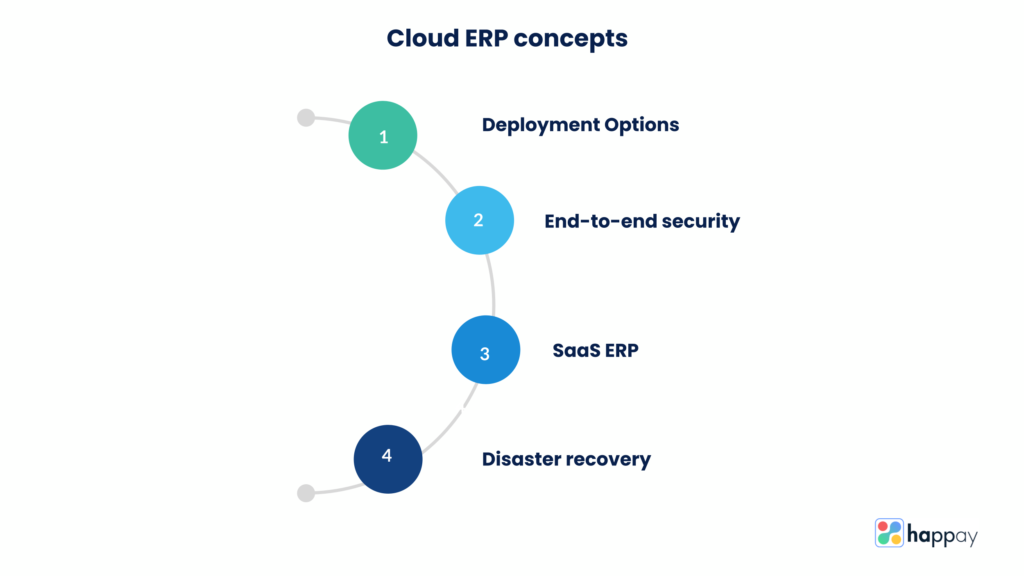
1. Deployment options
These are the options available for businesses to manage and implement the ERP software. You can choose cloud, managed hosting, or single or multi-tenant SaaS (software as a service).
2. End-to-end security
It includes the encrypted and secure connection that binds businesses with vendors. This connection helps companies access their business and customer-related information.
3. SaaS ERP
It is a software that manages and delivers the cloud. The cloud hosts the tools instead of the local computers. Furthermore, the vendor remains responsible for the management of those tools.
4. Disaster recovery
It is one of the several advantages offered by cloud-based ERPs. The disaster recovery framework includes the policies and procedures to recover data in case of disruptions.
Also, Read: Vendor Payments: Definition and Importance
Features of cloud ERP
As a business owner, you must have a lot on your mind. You must consider the product or service you are offering, your customers, employees, and the bottom line. When it comes to ERP, you should also consider the upfront cost, implementation time, and whether your employees can use it. Some typical features of cloud ERP systems are:
1. Ease of use
ERP system should be easy to use so that your employees can quickly learn and adopt it. The cloud ERP system should have a user-friendly interface and provide users with the necessary training and support. Companies that offer cloud ERP systems often provide free or low-cost training to help business owners and employees get the most out of the system.
2. Flexibility
Cloud ERP systems are typically more flexible than on-premise ERP systems. Some cloud ERP solutions offer a “pay as you go” pricing model, which can be helpful for businesses that have fluctuating or seasonal needs. Cloud ERP systems can also be scaled up or down to meet the changing needs of a business.
3. Accessibility
With cloud ERP, you and your employees can access the system from anywhere with an Internet connection. This can be helpful for your employees’ workflows who work remotely or travel frequently. For project management, some cloud ERP solutions offer mobile apps that allow users to access the system while on the go.
4. Customizations and integrations
Most cloud platforms offer some degree of customization and integration. You can select the features and modules that best meet your needs.
For example, you might only need the accounting and inventory management features of an ERP system. Some cloud ERP providers offer pre-built integrations with popular business applications, such as QuickBooks, Salesforce, and Google Apps.
5. Security
Security is often a concern for business owners regarding cloud computing. However, cloud ERP providers typically have robust security measures, such as data encryption and user authentication.
You should always check with a potential provider to see what security measures are in place. Cloud-based ERP solutions can provide your business with high security and peace of mind.
Also, Read: What is Cloud Accounting?
Benefits of cloud ERP software
Regarding enterprise resource planning (ERP) software, small and midsize businesses (SMBs) have more choices than ever. Cloud ERP solutions offer many benefits, each customizable to meet the needs of growing businesses.
Financial management, inventory control, order processing, and shipping are only a few of the areas where ERP systems can increase efficiency and productivity.
Some benefits of cloud ERP software include:
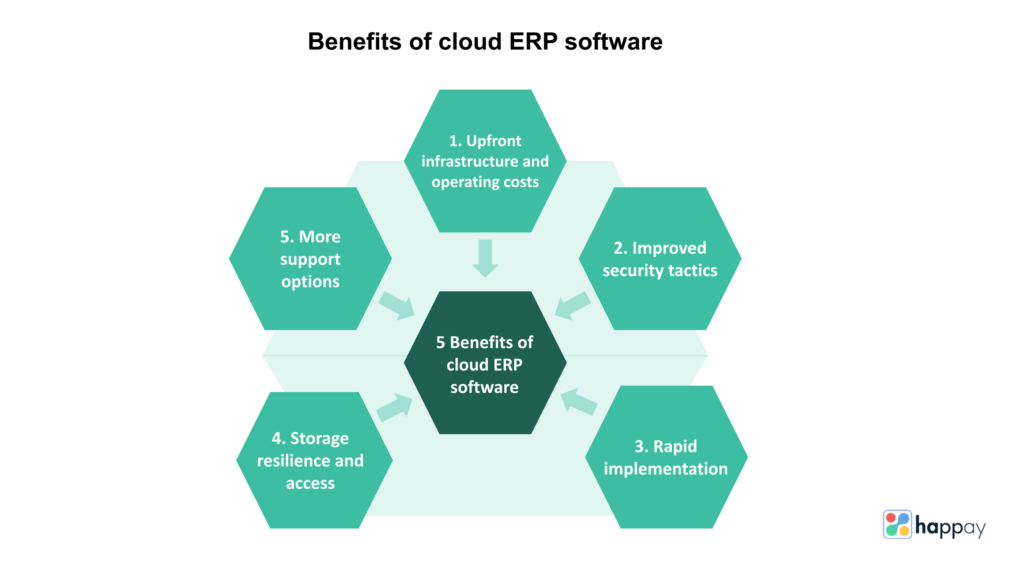
1. Upfront infrastructure and operating costs
Companies that use cloud ERP solutions do not need to purchase and maintain their hardware or hire in-house IT staff to keep things running smoothly. The cloud ERP provider also handles maintenance and upgrades, so there are no unexpected costs or downtime due to system updates.
2. Improved security tactics
Cloud ERP providers use the latest security technologies and practices to protect their customers’ data. In addition, data is typically stored in multiple locations, so backups are available even if one site is compromised. For customer relationship management, security is improved by encrypting data both in transit and at rest.
3. Rapid implementation
Cloud ERP solutions can be up and running quickly, often in weeks. This is because there is no need to install software or set up hardware. Users can log in to the system via the internet and start using it immediately. Implementing new modules and ensuring compatibility with other business applications is much easier with cloud ERP systems.
4. Storage resilience and access
If a company’s on-premises ERP software servers are damaged or lost, all of the data stored on them is also usually lost. With cloud ERP, data is stored in the cloud and can be accessed from anywhere there is an internet connection. This makes it much easier to recover from big and small disasters. It is also beneficial for companies with multiple locations, as data can be accessed anywhere.
5. More support options
When a company uses an on-premises ERP system, it is responsible for providing its support. This can be expensive and time-consuming. With cloud ERP, the provider offers support for the system. This frees up businesses to focus on their core competencies. For ERP software market leaders like SAP and Oracle, support is included in the subscription price.
Also, Read: 9 Best Accounting Software for Your Company
Cloud ERP vs. On-Premises ERP
There are several key differences between cloud ERP and on-premises ERP systems.
Here are a few of the most important factors:
| Cloud ERP | On-Premises ERP | |
| Deployment Model | Cloud ERP is hosted off-site by the ERP cloud vendors. | On-premises ERP systems are installed and run on company-owned servers. |
| Subscription Model | Cloud ERP is typically a subscription service, with users paying a monthly or annual fee. | On-premises ERP systems require a one-time upfront license fee. |
| Total Cost of Ownership (TCO) | Cloud ERP typically has a lower TCO and provides a quicker return on investment. | On-premises ERP systems have a higher TCO but may provide a longer ROI. |
| Boosts Productivity | Cloud ERP systems can be accessed from anywhere with an internet connection, making it easy for employees to work remotely. | On-premises ERP systems are only accessible from company computers on the company network. |
| Flexibility and Scalability | Cloud ERP systems are more flexible and scalable | On-premises ERP systems are less flexible and scalable |
| Security | Cloud ERP systems have robust security features, such as data encryption and user authentication. | On-premises ERP systems may have weaker security features since they are not subject to the same stringent security standards as cloud providers. |
Types of cloud ERP software
Not all cloud ERP software is created equal. To ensure that you are making the best decision for your business, it is essential to understand the different types of software available. Some legacy ERP vendors have retrofitted their software to be “cloud-ready,” but this is not the same as a proper cloud solution.
Cloud-based ERP software is categorized into multiple types:
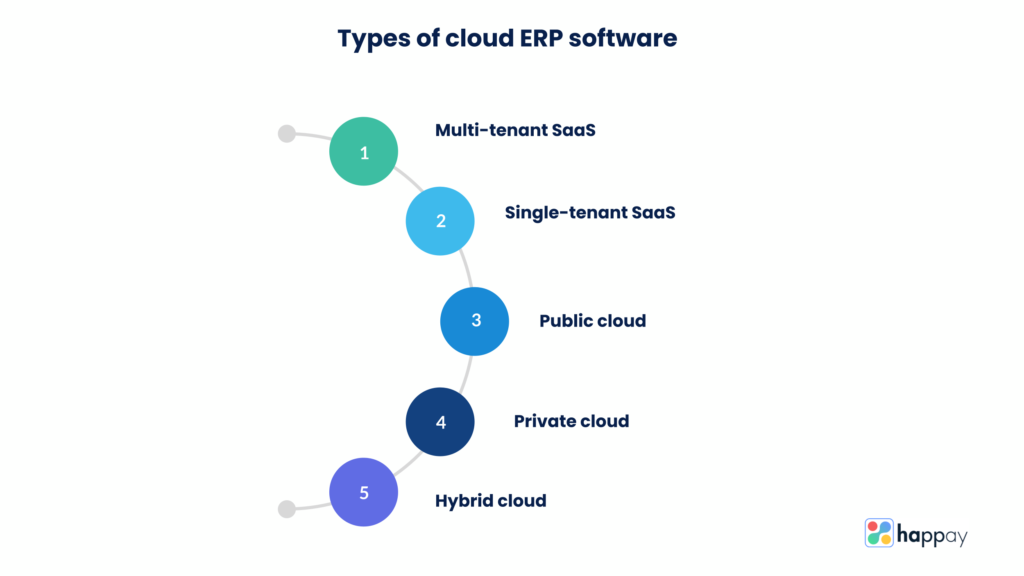
1. Multi-tenant SaaS
It is a single code base shared among all customers. The provider manages all upgrades and maintenance. Customers do not have access to the code or database. Multi-tenant SaaS solutions are typically less expensive than other types of cloud ERP software. With a cloud-based ERP system, all your users will be on the latest version with all the new features, security patches, and bug fixes.
2. Single-tenant SaaS
Typically used by larger organizations, it has each customer using its code base and database. The provider manages all upgrades and maintenance for each customer. Conversely, single-tenant SaaS solutions help organizations keep a high degree of control over their data and processes.
3. Public cloud
The provider owns the infrastructure, and customers access it over the internet. Public clouds are less expensive than private clouds but also have security risks. When using a public cloud, it is essential to ensure that your data is encrypted both in transit and at rest. Examples of public cloud providers include Amazon Web Services (AWS), Microsoft Azure, and Oracle cloud ERP.
4. Private cloud
The customer owns the infrastructure, and the provider manages it. Private clouds are more expensive than public clouds, but they offer a higher degree of security. Private clouds are often used by organizations that deal with sensitive data, such as healthcare organizations. Private clouds are not shared with other customers, so you can be sure that your data is secure.
5. Hybrid cloud
A hybrid cloud combines a public and private cloud. With a hybrid cloud, you can keep sensitive data on a private cloud while less sensitive data is stored on a public cloud. Hybrid ERP clouds offer the best of both worlds by allowing you to take advantage of the cost savings of a public cloud while still keeping your data secure.
Suggested Read: 10 Best Expense Management Software
Best cloud ERP software solutions
Here’s our pick of the top five cloud ERP solutions you can consider for your business.
1. Oracle
Oracle is one of the leading names in the cloud ERP software and digital transformation space. It offers Oracle NetSuite and Oracle ERP Cloud, specifically designed to meet the needs of enterprise businesses. Oracle employs leading AI and ML-based solutions that lend more credibility to their solutions.
2. SAP
SAP has been serving the industry and businesses of various sizes and scales for over four decades. It has a user-friendly system that manages the entire operations. Their solutions and integrated processes enable enhanced efficiencies across the organization.
3. Microsoft
Just like Oracle and SAP, Microsoft’s cloud application has been around for years and needs no introduction. They are always at the forefront of creating new data centers to support the advanced capabilities of the cloud. Dynamics 365 suite is one of their flagship offerings.
4. NetSuite
NetSuite is a cloud-based Enterprise Resource Planning (ERP) software that offers a range of business management capabilities, including financial management and customer relationship management (CRM). It is suitable for companies of all sizes and industries.
5. Infor CloudSuite
Infor’s cloud ERP services help organizations meet ever-changing business demands. They help businesses overcome traditional challenges related to outdated and legacy systems. Infor’s solutions help unlock the hidden capabilities that businesses can use to optimize their operations.
Also, Read: 10 Best Travel Management Software
Challenges of cloud ERP software
While cloud ERP has many benefits, it also comes with specific challenges that businesses should be aware of before making the switch. Cloud ERP vendors may not offer the same level of customization as on-premise ERP vendors, meaning that businesses may have to adapt their processes to fit the software rather than the other way around.
Some other challenges of cloud ERP software include:
1. Security concerns
When entrusting sensitive company data to a third party, it’s essential to ensure that the vendor has robust security measures to protect your data.
Research and ask plenty of questions about a vendor’s security protocols before signing on the dotted line. For supply chain management software, mainly, it’s also important to consider whether the software can interface with your existing security systems.
2. Lack of control
Because you don’t physically own the servers where your data is stored, you may feel you have less control over your data than you would with an on-premise solution. If you’re uncomfortable ceding control of your data to a third-party, cloud ERP may not be the right solution for you.
3. Vendor lock-in
Once you’ve invested in a cloud ERP system, switching to a different vendor can be difficult and expensive. Before signing a contract with a cloud ERP vendor, ask about exit clauses and fees to know what you’re getting into.
4. Regulatory compliance
Depending on your industry, you may be subject to specific regulations that dictate where and how your data can be stored. Be sure to check with your legal team before investing in a cloud ERP solution to ensure that the vendor you’re considering complies with all relevant regulations.
Also, Read: 12 Best Invoicing Software for Your Business
How to choose the right cloud ERP software?
When choosing a cloud-based ERP software, there are several factors to consider to ensure you select the right solution for your business:
1. Functionality
First and foremost, it’s important to make sure the software has the features and capabilities that your business needs. This may include financial management, inventory control, supply chain management, and more.
2. Scalability
Choose a solution that can scale with your business as it grows. This will ensure you don’t outgrow the software too quickly, which can be costly and disruptive.
3. Integration
Consider how well the ERP software integrates with your existing systems and processes. The easier it is to integrate, the more smoothly the implementation process will go.
4. User experience
It is vital that the software is easy to use and navigate for all employees who will be using it.
5. Cost
Compare the costs of different software options to ensure you get the best value for your money. Be sure to consider not only the upfront cost, but also any ongoing fees such as maintenance and support.
6. Vendor reputation
Do your research on the vendor to make sure they have a good reputation and a track record of providing reliable software and support.
Quick Read: How to Choose the Right Expense Tracking Software?
When is the right time to switch to cloud ERP?
There are a few signs that may indicate it’s time to switch to a cloud-based ERP system:
- Your current system is outdated or no longer meeting your needs: If your current system is no longer able to keep up with the needs of your business, it may be time to switch to a newer, more capable solution.
- You’re experiencing growth: As your business grows and experiences profitability, you may find that your current system becomes overwhelmed and can no longer support your operations efficiently. In this case, a cloud-based ERP system can provide the scalability you need to support your growth.
- You’re spending too much time and money on maintenance: If you’re spending a significant amount of time and money on maintaining your current system, switching to a cloud-based solution maintained by the vendor may be more cost-effective.
- You want to improve collaboration and access to information: Cloud-based ERP systems offer greater accessibility and collaboration capabilities, as employees can access the system from anywhere with an internet connection. This can help improve communication and decision-making within your organization.
FAQs
Businesses of all sizes can benefit from a cloud ERP system. Cloud ERP systems are highly scalable and can grow with your business functions. They’re also more affordable than traditional on-premise ERP systems since you only pay for the resources you use.
ERP software helps businesses manage their core operations, such as finance, HR, and supply chain. Cloud computing is a type of computing that delivers services over the internet.
Yes, you can. Many ERP vendors offer cloud versions of their software. However, you may need to purchase new licenses or upgrade your existing licenses to use the cloud version. With a cloud ERP system, you can also take advantage of additional features, such as real-time data and automatic updates.



